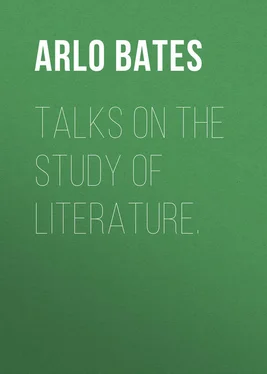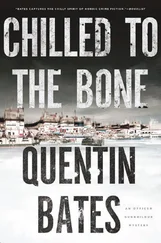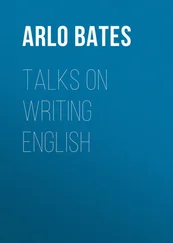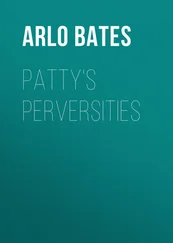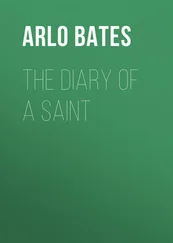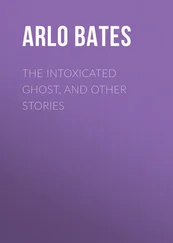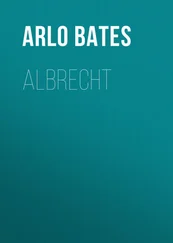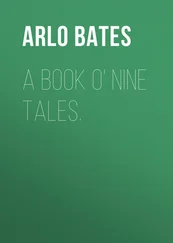Arlo Bates - Talks on the study of literature.
Здесь есть возможность читать онлайн «Arlo Bates - Talks on the study of literature.» — ознакомительный отрывок электронной книги совершенно бесплатно, а после прочтения отрывка купить полную версию. В некоторых случаях можно слушать аудио, скачать через торрент в формате fb2 и присутствует краткое содержание. Жанр: foreign_antique, foreign_prose, на английском языке. Описание произведения, (предисловие) а так же отзывы посетителей доступны на портале библиотеки ЛибКат.
- Название:Talks on the study of literature.
- Автор:
- Жанр:
- Год:неизвестен
- ISBN:нет данных
- Рейтинг книги:5 / 5. Голосов: 1
-
Избранное:Добавить в избранное
- Отзывы:
-
Ваша оценка:
- 100
- 1
- 2
- 3
- 4
- 5
Talks on the study of literature.: краткое содержание, описание и аннотация
Предлагаем к чтению аннотацию, описание, краткое содержание или предисловие (зависит от того, что написал сам автор книги «Talks on the study of literature.»). Если вы не нашли необходимую информацию о книге — напишите в комментариях, мы постараемся отыскать её.
Talks on the study of literature. — читать онлайн ознакомительный отрывок
Ниже представлен текст книги, разбитый по страницам. Система сохранения места последней прочитанной страницы, позволяет с удобством читать онлайн бесплатно книгу «Talks on the study of literature.», без необходимости каждый раз заново искать на чём Вы остановились. Поставьте закладку, и сможете в любой момент перейти на страницу, на которой закончили чтение.
Интервал:
Закладка:
Arlo Bates
Talks on the study of literature
I
WHAT LITERATURE IS
As all life proceeds from the egg, so all discussion must proceed from a definition. Indeed, it is generally necessary to follow definition by definition, fixing the meaning of the terms used in the original explanation, and again explaining the words employed in this exposition.
I once heard a learned but somewhat pedantic man begin to answer the question of a child by saying that a lynx is a wild quadruped. He was allowed to get no further, but was at once asked what a quadruped is. He responded that it is a mammal with four feet. This of course provoked the inquiry what a mammal is; and so on from one question to another, until the original subject was entirely lost sight of, and the lynx disappeared in a maze of verbal distinctions as completely as it might have vanished in the tangles of the forest primeval. I feel that I am not wholly safe from danger of repeating the experience of this well-meaning pedant if I attempt to give a definition of literature. The temptation is strong to content myself with saying: "Of course we all know what literature is." The difficulty which I have had in the endeavor to frame a satisfactory explanation of the term has convinced me, however, that it is necessary to assume that few of us do know, and has impressed upon me the need of trying to make clear what the word means to me. If my statement seem insufficient for general application, it will at least show the sense which I shall give to "literature" in these talks.
In its most extended signification literature of course might be taken to include whatever is written or printed; but our concern is with that portion only which is indicated by the name "polite literature," or by the imported term "belles-lettres," – both antiquated though respectable phrases. In other words, I wish to confine my examination to those written works which can properly be brought within the scope of literature as one of the fine arts.
Undoubtedly we all have a general idea of the limitations which are implied by these various terms, and we are not without a more or less vague notion of what is indicated by the word literature in its most restricted and highest sense. The important point is whether our idea is clear and well realized. We have no difficulty in saying that one book belongs to art and that another does not; but we often find ourselves perplexed when it comes to telling why. We should all agree that "The Scarlet Letter" is literature and that the latest sensational novel is not, – but are we sure what makes the difference? We know that Shakespeare wrote poetry and Tupper doggerel, but it by no means follows that we can always distinguish doggerel from poetry; and while it is not perhaps of consequence whether we are able to inform others why we respect the work of one or another, it is of much importance that we be in a position to justify our tastes to ourselves. It is not hard to discover whether we enjoy a book, and it is generally possible to tell why we like it; but this is not the whole of the matter. It is necessary that we be able to estimate the justice of our preferences. We must remember that our liking or disliking is not only a test of the book, – but is a test of us as well. There is no more accurate gauge of the moral character of a man than the nature of the books which he really cares for. He who would progress by the aid of literature must have reliable standards by which to judge his literary feelings and opinions; he must be able to say: "My antipathy to such a work is justified by this or by that principle; my pleasure in that other is fine because for these reasons the book itself is noble."
It is hardly possible to arrive at any clear understanding of what is meant by literature as an art, without some conception of what constitutes art in general. Broadly speaking, art exists in consequence of the universal human desire for sympathy. Man is forever endeavoring to break down the wall which separates him from his fellows. Whether we call it egotism or simply humanity, we all know the wish to make others appreciate our feelings; to show them how we suffer, how we enjoy. We batter our fellow-men with our opinions sufficiently often, but this is as nothing to the insistence with which we pour out to them our feelings. A friend is the most valued of earthly possessions largely because he is willing to receive without appearance of impatience the unending story of our mental sensations. We are all of us more or less conscious of the constant impulse which urges us on to expression; of the inner necessity which moves us to continual endeavors to make others share our thoughts, our experiences, but most of all our emotions. It seems to me that if we trace this instinctive desire back far enough, we reach the beginnings of art.
It may seem that the splendidly immeasurable achievements of poetry and painting, of architecture, of music and sculpture, are far enough from this primal impulse; but I believe that in it is to be found their germ. Art began with the first embodiment of human feelings by permanent means. Let us suppose, by way of illustration, some prehistoric man, thrilled with awe and terror at sight of a mastodon, and scratching upon a bone rude lines in the shape of the animal, – not only to give information, not only to show what the beast was like, but also to convey to his fellows his feelings when confronted with the monster. It is as if he said: "See! I cannot put into words what I felt; but look! the creature was like this. Think how you would feel if you came face to face with it. Then you will know how I felt." Something of this sort may the beginnings of art be conceived to have been.
I do not mean, of course, that the prehistoric man who made such a picture – and such a picture exists – analyzed his motives. He felt a thing which he could not say in words; he instinctively turned to pictorial representation, – and graphic art was born.
The birth of poetry was probably not entirely dissimilar. Barbaric men, exulting in the wild delight of victory, may seem unlikely sponsors for the infant muse, and yet it is with them that song began. The savage joy of the conquerors, too great for word, found vent at first in excited, bounding leaps and uncouthly ferocious gestures, by repetition growing into rhythm; then broke into inarticulate sounds which timed the movements, until these in turn gave place to words, gradually moulded into rude verse by the measures of the dance. The need of expressing the feelings which swell inwardly, the desire of sharing with others, of putting into tangible form, the emotions that thrill the soul is common to all human beings; and it is from this that arises the thing which we call art.
The essence of art, then, is the expression of emotion; and it follows that any book to be a work of art must embody sincere emotion. Not all works which spring from genuine feeling succeed in embodying or conveying it. The writer must be sufficiently master of technique to be able to make words impart what he would express. The emotion phrased must moreover be general and in some degree typical. Man is interested and concerned in the emotions of men only in so far as these throw light on the nature and possibilities of life. Art must therefore deal with what is typical in the sense that it touches the possibilities of all human nature. If it concerns itself with much that only the few can or may experience objectively, it has to do with that only which all human beings may be conceived of as sharing subjectively. Literature may be broadly defined as the adequate expression of genuine and typical emotion. The definition may seem clumsy, and hardly exact enough to be allowed in theoretical æsthetics; but it seems to me sufficiently accurate to serve our present purpose. Certainly the essentials of literature are the adequate embodiment of sincere and general feeling.
Читать дальшеИнтервал:
Закладка:
Похожие книги на «Talks on the study of literature.»
Представляем Вашему вниманию похожие книги на «Talks on the study of literature.» списком для выбора. Мы отобрали схожую по названию и смыслу литературу в надежде предоставить читателям больше вариантов отыскать новые, интересные, ещё непрочитанные произведения.
Обсуждение, отзывы о книге «Talks on the study of literature.» и просто собственные мнения читателей. Оставьте ваши комментарии, напишите, что Вы думаете о произведении, его смысле или главных героях. Укажите что конкретно понравилось, а что нет, и почему Вы так считаете.
